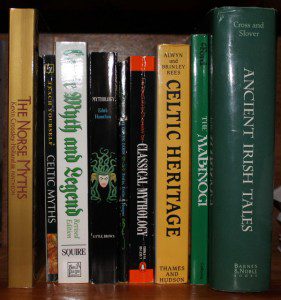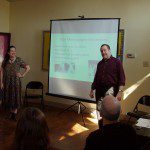In a sermon several years ago, Denton UU Minister Emeritus Rev. Don Fielding said “there is only the natural world and it is enough.” I’ve always appreciated that about Don – he tells you what he really thinks. At the same time, he’s been supportive of those of us who see things differently. He led the memorial service for CUUPS member James Stevens in 2010 and did a beautiful job that honored James and his Pagan beliefs. Don Fielding is a good minister and a good friend.
So it really is with great respect to Rev. Fielding I say that even though I have a strong commitment to Nature, the natural world is not enough for me. Even in the most skeptical times of my religious search I never seriously considered atheism. I couldn’t believe in the god of the fundamentalists, but something deep inside always whispered “there’s more.”
Deities are another center of the modern Pagan movement. For me, they are the most important center. My early Pagan explorations kept getting stalled because I wanted to keep the vague deistic universalism I had adopted after I left fundamentalism. After my defining moment I began concentrating on Goddess and God, and then on goddesses and gods. That put me firmly on the path I follow today.
This is what it means to me to be a deity centered Pagan: this is my commitment to the gods.
 A commitment to the gods is a commitment to learn who they are. The old gods never died, but their common worship ended centuries ago. Some faded into obscurity, while others were incorporated into myth and legend. Over the years they’ve been adopted – and in some cases, exploited – by various popular cultures. Even people who recognize a particular goddess or god likely have more misinformation about them than real knowledge of who and what they are.
A commitment to the gods is a commitment to learn who they are. The old gods never died, but their common worship ended centuries ago. Some faded into obscurity, while others were incorporated into myth and legend. Over the years they’ve been adopted – and in some cases, exploited – by various popular cultures. Even people who recognize a particular goddess or god likely have more misinformation about them than real knowledge of who and what they are.
Learning who they are begins with reading their stories. This is easier for some pantheons than for others, and we must avoid the temptation to turn myths into scripture. But the best way to learn about the gods is to read their tales.
Learn how they were worshipped. Mainstream scholarship can be very helpful here. Again, this is easier for some than for others. We know quite a bit about ancient Greek religion. The Celts didn’t write anything down and much of what we have in the way of second-hand reports comes from dubious sources. But there’s more information about them than you may think. As an example, see the links under “Analysis” on the Coru Cathubodua resources page. I’ve read the two doctoral dissertations linked to on the page – they’ve been extremely helpful in understanding where and how Morrigan was worshipped. That in turn helps us figure out the best way to approach these deities here and now.
Read and talk to their contemporary followers. While we are informed and inspired by the past, we live in the present. So do our gods and goddesses. If one of them is calling to you, odds are good he or she already has followers. Some of them have even written books. Look around and ask around – there’s no need to reinvent the polytheistic wheel.
 A commitment to the gods is a commitment to form a reciprocal relationship with them. There are many gods and many people – that means there are many different relationships and types of relationships. Some formal, some are casual, and some are quite intimate. There is no one right way, but there are some activities that can be helpful to anyone.
A commitment to the gods is a commitment to form a reciprocal relationship with them. There are many gods and many people – that means there are many different relationships and types of relationships. Some formal, some are casual, and some are quite intimate. There is no one right way, but there are some activities that can be helpful to anyone.
Talk to them – pray regularly. Jason Mankey has a very nice Hellenic ritual on his blog featuring some prayers from the Homeric Hymns. I’ve used some of those prayers too – there is power in their tradition and heritage. But spontaneous prayer is helpful too: stand in front of your altar or under the moon and speak the yearnings of your heart. We rightly want to avoid prayers that sound like a four-year-old’s Christmas list, but vocalizing what you value, what you need, and your thanks for what you have is always a good thing.
Listen to them – meditate regularly. You aren’t likely to hear audible voices and you may not hear voices in your head. Sometimes they speak in signs or omens, sometimes in feelings or impressions. Remain open as to how they will speak to you.
Sacrifice. Sometimes this means “to give up” and sometimes it means “to make sacred.” Pour libations. Share your food and drink. Give to others in their names. This isn’t some sort of divine bribery – as though the gods could be bribed with a glass of wine. It’s following the tradition of hospitality and reciprocity – the gods give to us, so we give to the gods and to each other, setting up a virtuous circle of giving and receiving.
Our goddesses and gods are not the “totally other” god proposed by the monotheists. Like every other living being in the Universe, they are part of the unity of all and are therefore related to us. But they are not us – they are older, wiser, and far more powerful than we are. Our relationships with the gods should be reciprocal, but they are not equal. Their concerns and priorities may be very different from our concerns and priorities. Your comfort and convenience is not likely to be their highest priority – set your expectations accordingly.
A commitment to the gods is a commitment to embody their virtues. Most of our deities have the title “God or Goddess of Somethingorother.” This is not all they are any more than “artist” or “engineer” or “mother” or any of your roles and identities fully describes all you are. Still, it’s an important part of who they are and what they have to teach us.
If you would be committed to Morrigan, commit to sovereignty, to self-determination in your life and in the lives of others. Commit to protect your family and your community from those who would do it harm, whether they are Fomorians, politicians or corporations. Commit to caring for those damaged by conflict and helping them transition to new lives.
If you would be committed to Cernunnos, commit to living free and wild and to nurturing the natural world. If you would be committed to Brighid, commit to healing others, to crafting things of beauty and usefulness, and to being a source if inspiration. If you would be committed to another, find their virtues and manifest them in this world.
The gods are different from us, but not so very different. The more we embody their virtues, the more like them – the more god-like – we become.
I’m a Nature-centered Pagan and a Deity-centered Pagan. There are other centers to my Paganism – I’ll write about them in the near future. But together, these two centers form the backbone of a spiritual and religious practice that has given me an amazing sense of belonging, purpose and fulfillment.
















